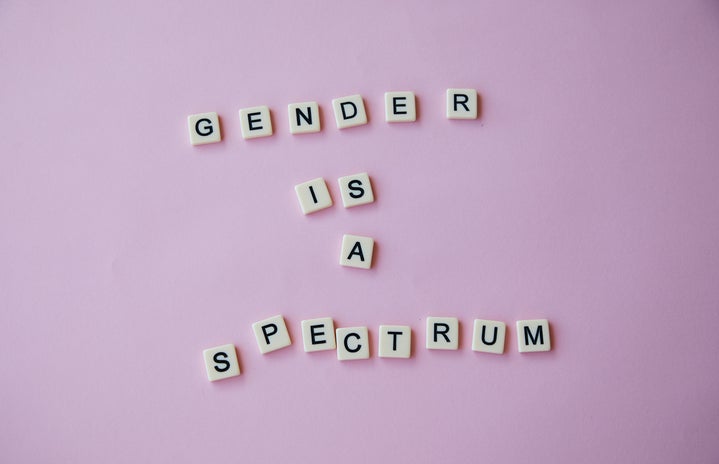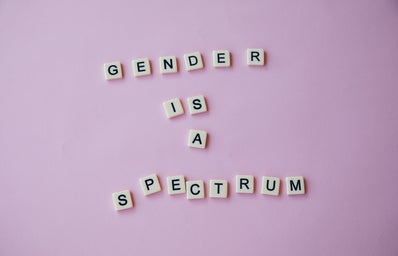As the years go on, you might be seeing more and more talk on those who are coming out as non-binary. Non-binary or genderqueer folk are considered to be people who are neither male nor female and hold identities outside the typical gender binary. It may not appear to be a scary concept, but for those who come out as non-binary, they may face a wave of uncertainty and backlash from the world around them. Compared to the typical she/her/hers or he/him/his pronouns, a person who is non-binary may use they/them/theirs, she/they, or even he/they when referring to themselves. At the beginning of this year and after many years of wondering and feeling still like a ghost in my own shell, I had realized that maybe I was non-binary. Many were okay with the discussion of it, others were hesitant to utilize my pronouns due to referring to me as female for multiple years prior. I did not want to delve into the discussion with my family, because when I had ultimately came out as queer years back, they had not been as accepting or willing to learn as I had hoped. Others who barely knew me ridiculed and judged me due to the fact that I, “did not dress like someone who was non-binary,” which brings me to the question: What does non-binary mean to you?
What Does Non-Binary Look Like?
The answer is simple actually. No non-binary person needs to fit into a specific look in order to fit into societal norms. That is quite literally the same as telling someone they need to dress more like their sexual orientation. There is this consistent stigma that people who are non-binary or genderqueer need to have a more androgynous style and or look to them in order to be accepted. It is no wonder that there had been major backlash due to this rhetoric when I had posted a selfie in a full face of makeup and feminine attire on my social media. “But you look like you still, I don’t understand,” said numerous people. Nothing will change in a person once they are comfortable with telling the world their identity. In other words, just because you come out to the world or express your identity to the world on your own accord doesn’t mean you have to present yourself in the way the world thinks you should, or present yourself in what the world perceives non-binary folks or any other gender identity looks like. This is because it truly doesn’t matter what it looks like to anyone else. This how the person wants and or feels comfortable presenting themselves as. They have always held those pronouns and knew from the start who they were. This goes also for people who are transgender and may be transitioning or in the process of figuring out who they actually are. It’s about being comfortable with the skin that you are in– loving and knowing the person you are and who you are becoming. If that makes people uncomfortable, then pay them absolutely no mind. You as a person are not entitled to allow society to break you down in order to fit into the preconceived idea of what you are supposed to look like.
Truth or Trend?
At times, the idea or concept of a person utilizing a statement of “coming out” as non-binary, genderqueer or even queer in general as stance as a publicity statement has been seen as a form of attention seeking to outsiders looking in. This idea actually is very harmful to the stigmatization of the LGBTQ+ community. Just like anyone within this community, people who are non-binary face many acts of discrimination, which include lack of acceptance and judgement. This begs the ongoing question that most people who are queer use: “Why would I put myself in a position where people can harm me solely for my own attention seeking purposes?” While yes, some people may use a “fake coming out” as a ploy to attack the community, it really isn’t likley. Both sexual and gender identities are not something to joke about. This is quite literally someone’s whole being, and who they are as well as who they are comfortable with as a person. For someone to feel okay enough to share that with the world is a powerful tool that helps assist those who may not be able to. It creates a sense of belonging and gives those who may not have the ability to speak on their true self to have a sense of comfort and security in knowing that they truly are not alone. Celebrities like Halsey, Jonathan Van Ness from Queer Eye, Sam Smith, and Demi Lovato all have come out stating that they are gender non-conforming and do not label themselves as male or female. So many people look up to and follow celebrities on social media, and as someone who actually identifies as a queer, non-binary person I find comfort in seeing celebrities speak on themselves this way just as much as I love finding community in people just like me.
At the end of the day, those who are non-binary are not monsters. We are not your latest fad or trend to go off of. We are actual people who are deserving of the love and happiness in life that we have consistently worked hard to achieve. Though the transition of our pronouns now, compared to what the old ones were, may be occasionally hard to grasp, most of us are happy that you are willing to learn and try to make us feel comfortable.


